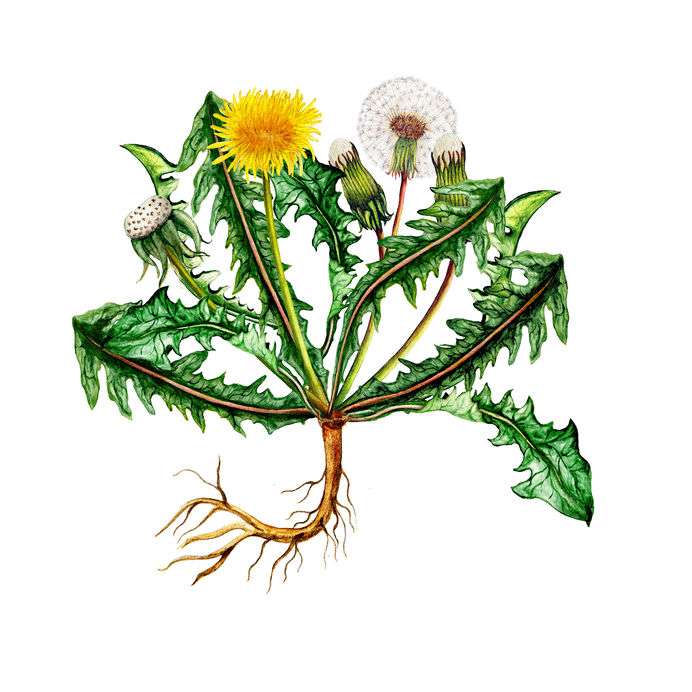
Pretty little puffballs!
Dandelions are often thought of as weeds. They grow everywhere and their little puffballs go flying in the wind with just a breath of air. Did you know that they’ve been around forever; probably about 30 million years. However, they’ve only been in North America for a couple of centuries – having made their grand entrance on the Mayflower, it’s believed, brought here for their medicinal purposes.
Lion's tooth flower?
Dandelion is translated from dent de lion (tooth of the lion) because its leaves look like a lion’s tooth. The genus name, Taraxacum, is derived from the Greek taraxos, meaning “disorder,” and akos, meaning “remedy.” And it’s no wonder why it’s been called that. Dandelion greens are known as Taraxacum officinale.
Part of the flowering plants in the family Asteraceae, including Jerusalem Artichoke, the plant is also known as blowball, cankerwort, milk witch, lion's-tooth, yellow-gowan, Irish daisy, and puffball. It gets some of these names because when the plant starts to seed, the flower turns into a white ball of puff that you can blow away, so it is also referred to as "blowball" or "puffball."

Dandelions as food!
Dandelions have been used by humans for food and as an herb for much of recorded history. They were well-known to ancient civilizations and have been used in traditional Chinese medicine to treat hepatitis, bronchitis, mastitis, and to enhance immune response to upper respiratory infections, for over a thousand years.
Dandelion was first noted for its medicinal qualities in the works of Arabian physicians of the tenth and eleventh centuries as being used to treat liver and spleen disorders. Native Americans used the dandelion root in preparations to treat kidney disease and heartburn.
The entire plant, including the leaves, stems, flowers and roots, is edible and has a high nutritional value. The root was traditionally roasted and consumed as a beverage, while the leaves and flowers were used in salads and other raw vegetable dishes. Dandelions are low in calories and high in fiber. It contains abundant vitamins and minerals, especially vitamins A, C, D, K, and B-complex.
Dandelions are also a good source of manganese, magnesium, calcium, iron, zinc, phosphorus, sodium, beta-carotene, and potassium. They are especially high in antioxidants. The roots are rich in inulin, a prebiotic that helps encourage the growth of healthy microorganisms in the gastrointestinal tract.

Dandelion is thought to help provide the following health benefits:
• improving appetite
• reducing joint pain and muscle aches
• helping relieve digestive ailments, upset stomach and intestinal gas
• stimulating the functions of the stomach, liver and bile
• treating infection
• treating skin conditions
• as a laxative
• as a diuretic
Sauteed Spicy Dandelion Greens and Onions features onions, cloves, a hot Italian cherry pepper and ground black pepper. Spice up those greens with this recipe!
Dandelions are pretty and useful. So much more than pesky weeds!
If you'd like to check out some products that contain dandelion, please visit these links:
Lipo-Plex by Dynamic Nutritional Associates (DNA Labs)
Gastrozyme by Dynamic Nutritional Associates (DNA Labs)
Lax-Ease by by Professional Botanicals
Lipo Zymes by Professional Botanicals
Liver Detox by Professional Botanicals
Liver Detox + Silymarin by Professional Botanicals
Lymph Detox by Professional Botanicals
pH Balance by Professional Botanicals
Serrapeptase + Prozyme by Professional Botanicals
Water Balance by Professional Botanicals
Multi-Plus by Dynamic Nutritional Associates (DNA Labs)
_______________________________________________________________________________________________
Note: The content of this article, and additional content on this website, are for informational purposes only and are not intended to be a substitute for professional medical advice, diagnosis, or treatment. Always seek the advice of a physician or other qualified health provider with any questions you may have regarding a medical condition. Never disregard professional medical advice or delay in seeking help because of something you read here on this website.




